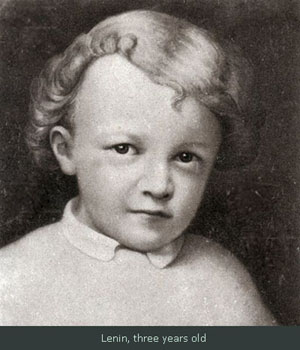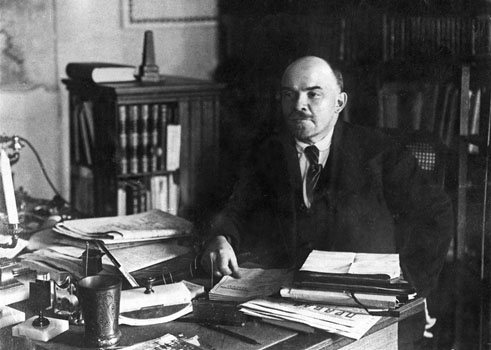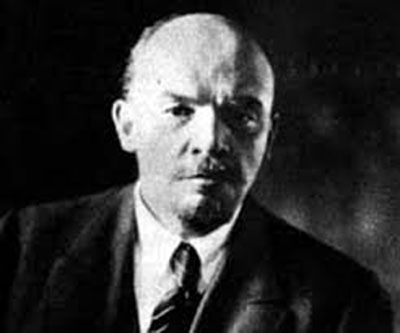|
Two portraits of Lenin
Anjan Basu

Even as Isaac Deutscher was working on his monumental biography of Leon Trotsky, he was getting ready for his next important project – a study of Lenin’s life. His notebooks from the Houghton Library, which housed the Trotsky Archives, bear frequent red-pencil marks of a big ‘L’, indicating the materials he thought would be useful for the Lenin biography. Indeed, the project had been at the back of his mind even earlier, when he was putting together material for his book Stalin: there the remark, “To be consulted for Lenin”, is scattered over much of his notes. We learn from Tamara Deutscher, Deutscher’s wife and colleague, that Deutscher visualized the biographies of the three foremost leaders of the Russian Revolution as “a single essay in a Marxist analysis of the revolution of our age and also a triptych of some artistic unity”. Sadly, Deutscher’s passing in 1967 at age sixty, while on a lecture tour of Rome, cut the Lenin study cruelly short. The great triptych remained unfinished.
Tamara later published the MS as a little book with the title Lenin’s Childhood, all of sixty-odd pages. In it, Lenin’s life is traced in broad outline up to his seventeenth year, or till immediately after his elder brother is hanged for his association with a plot to kill the Tsar. Clearly, the Lenin biography had been planned on the grand scale, grander perhaps than even the magisterial Trotsky study. About that biography, Deutscher, paraphrasing Carlyle, had said that his job consisted in dragging Trotsky out “from under a mountain of dead dogs, a huge load of calumny and oblivion”. In the Lenin biography, on the other hand, he saw his task as freeing the twentieth century’s greatest revolutionary from under the crushing weight of Soviet iconography and unenlightened orthodoxy. It is such a pity that the book did not progress beyond its first chapter. Here we take a look at this biographical fragment and place beside it Deutscher’s 1959 talk on Lenin on the BBC’s Third Programme, later published as The Moral Dilemmas of Lenin .
Unfinished though it is, Lenin’s Childhood delves deep into the obscure, and decidedly humble, origins of the Ulyanovs. (In the process, it presents a thumbnail, but striking, picture of the social conditions in which the most backward among Tsarist Russia’s poorer communities lived their lives in the 19th century.) Deutscher dismisses the Soviet-era myth that the Ulyanovs had traditionally been intellectuals and career professionals. He shows Lenin’s paternal grandfather as having come from Kalmuk or Tartar (not Russian) peasant stock struggling to make ends meet as a small-time tailor in Astrakhan. Ilya Ulyanov, Lenin’s father, was the first Ulyanov to secure a university education – indeed, any formal education – and rose through the ranks of school teachers to become first the Director of Primary Schools and later the Director of Public Schools in southern Russia’s Simbirsk (now Ulyanovsk) province. He was widely respected for his ability and professional integrity and his commitment to modernising the school system and reaching education to the province’s remotest corners was legendary. Awarded the Order of St Vladimir, he became a hereditary nobleman but stayed remarkably free from the trappings of high office. Lenin’s mother Maria, from a German-Swedish-Russian family, had received a liberal education at home, spoke Russian, German and French fluently, was widely read in Russian and European literature, loved music and played the piano with sensitivity and zest. Ilya was a devout Orthodox Christian but Maria, a Lutheran by upbringing, was largely indifferent to religion. Both were conservative moderates who enthusiastically embraced the reforms agenda of Tsar Alexander II, and neither felt drawn towards the political radicalism of their time. The couple struggled financially in the first few years of their marriage, but later settled into a more comfortable existence, though they hardly ever saved any money.

Deutscher shows the Ulyanovs to be a close-knit, friendly family. Their home rang all day with the laughter of its six healthy, bright children. Lenin, the third child, was baptized ‘Vladimir’, a name leading naturally to its usual Russian diminutive ‘Volodya’. Of all the siblings, Volodya was easily the noisiest and most roguish, but also the brightest. He learnt effortlessly and quickly, and was considered by the headmaster of the well-regarded Simbirsk gymnasium, where he studied, ‘the pride of the school’. Because of his extraordinarily high aptitude for Latin and for the humanities in general, the headmaster “had no doubt that Volodya would be a classical scholar of genius”. He was a voracious reader, had a flair for music and could already play the piano quite well when he was eight, and chess was his passion. But, much like others in the family, he had no feeling for the visual arts. He was helpful to his less able companions at school, but struck few really close friendships, probably because “his exceptional ability or his sharp eye or tongue kept (other boys) at a distance”. He was fearless, could even be reckless, and seemed to relish chaffing and mocking others a great deal. Only adolescence mellowed him somewhat, and gradually he became “less captious, less derisory”.
Volodya’s happy childhood must have contributed “to the character of the future revolutionary, to the self-confidence, inner balance, and fullness of his personality”. Till he was sixteen, no acute anxiety or grave shock cast a shadow on his life. Religious in a conventional sense, he observed religious rituals mechanically, without any great enthusiasm, but unquestioningly. Politics or political economy had not even begun to engage his attention at this stage, and contemporary social affairs were as remote to him as they could be to any apolitical youngster. Though he was not particularly close to his father, Ilya Ulanov’s example of high-minded and selfless service to society must have won Volodya’s admiration and respect. But his mother’s influence was deeper and steadier. He learnt from her how to be neat, orderly and industrious in his work. He may have also owed to her his proficiency in German and French.
His father’s death in January 1886 devastated the family, though it did not seem to affect Volodya, three months short of sixteen then, a great deal. Ilya Ulyanov died a broken-hearted man. The great liberal reforms initiated in the hopeful 1860s and 1870s – of which the abolition of serfdom had been the most important component – had begun to be rolled back after the assassination, in March 1881, of Tsar Alexander II. The new Tsar went about drastically curtailing the educational outreach programmes so dear to Ilya Ulyanov’s heart. Opening of new schools was summarily stopped, and school curricula were emptied out of all meaningful content. As his life’s work began to unravel, Ilya lost his optimism, his zest for life. Death came suddenly, apparently caused by a haemorrhage of the brain. He was fifty-four. (Exactly thirty-eight years later, Lenin was to die of the same cause, also aged 54, in a comparable state of physical exhaustion and mental stress).
Deutscher shows Alexander’s death in May 1887 in a different light to how Soviet iconography always presented it. Alexander was not enthused by individual terror as a means to ending autocracy. He was already familiar with the work of Marx and Plekhanov, and had come to believe that only a broad-based popular revolution could hope to bring about lasting and meaningful social change. That he had still allowed himself to be drawn into the conspiracy to kill the Tsar was because of his exasperation with a regime that had virtually sealed all legitimate avenues of protest and mobilisation. Alexander’s young mind chafed against the draconian censorship laws and ached to register its protest in any manner possible. At the trial which condemned him and his comrades to death, he conducted himself with remarkable poise and maturity, making an eloquent case for democratic reforms and asserting that many others would be induced to take his path, maybe against their better judgement, if Russia continued on its ruinous path. He refused to seek pardon and was executed in Shlisselburg on 20 May. Volodya was busy just then writing his final matriculation examination. He seemed to take the news of his brother’s arrest and trial calmly, though some of his contemporaries in the gymnasium later wrote about “the drooping, painstricken boy, struggling to contain his feelings within himself”. With extraordinary self-control, he wrote all his tests and passed them summa cum laude, earning his gold medal, as his headmaster had hoped.
Deutscher believes that it was only under the shock of Alexander’s fate that the world of Volodya’s childhood and adolescence came to an end.
His mind (was) suddenly plunged into social and political issues and his own destiny began to take on an unexpected shape. The medium of intimate personal experience made articulate to Vladimir the general cause for revolution in Russia – as if the conditions of Russian society had refracted themselves through the family tragedy.
This runs counter to given Soviet wisdom that Lenin had already decided on a revolutionary’s life for himself before Alexander’s death, and that he merely resolved at this point to not take Alexander’s path. Vladimir, Deutscher suggests, might well have become Lenin even without his brother’s tragic death, but “there can be no doubt about the impact of Alexander’s martyrdom on his early development as a revolutionary”.

If Lenin’s Childhood tells his story before he became Lenin, The Moral Dilemmas of Lenin captures the tenor of his last great battle, the one that broke his spirit like nothing else ever did. Lenin had had his first sclerotic attack in May,1922, when he had just turned fifty-two. He recovered slowly, got back to work by August, and seemed to be making steady progress until a second attack, deadlier than the first, laid him low on 15 December of the same year. The right side of his body was paralysed, he lost his speech and was unable to hold a pen any more. The two bullets lodged in his body since August, 1918 (when an assailant had tried to kill him) continued to seep lead toxicity into his system, making his condition even more critical. Needless to say that two decades lived as an outlaw, preceded by exile in Siberia and followed by five cataclysmic years at the helm of a young republic hemmed in on all sides by war, famine, starvation and civil war, had taken a heavy toll of his body. And yet, his health seemed to Lenin to be the least of his problems just then.
His mind was gripped by a terrible foreboding: that the Soviet state had perhaps lost its way and was headed to a quagmire. Lenin’s astringent realism had sustained him through the bleak years immediately following the revolution. Confronted with unrelenting hostility at home and from across her borders, Russia had teetered on the brink of ruin. Lenin, who had led the revolution hoping to do away with the oppressive state apparatus for good, had to cede ground to an enormously powerful, centralised, state structure that steadily snuffed out most democratic rights of many citizens. “Yet for five years he had, or appeared to have, a calm conscience, no doubt because he felt that he had retreated from his principles under the overwhelming pressure of circumstances........This confidence gave him what appears to be an unshakeable moral self-confidence in his course of action.” But now, when he realised he had very little time to live, his self-confidence broke down and he was seized by alarm. Hadn’t he gone too far? Wasn’t the new machine of power turning into a mockery of his principles? Was there something he had missed as he had gone along, other than the familiar features of Russia’s extreme backwardness and the humongous costs that her isolation had imposed upon Russia?
Though his body was failing him, Lenin’s mind still worked with relentless clarity. He went over the familiar basic factors of Russia’s situation over and over again in search of answers, till he came up with an astonishing realisation. Russia’s cultural backwardness had corrupted Lenin’s own party as well, and it was the obnoxious legacy of Tsarist totalitarianism that was showing up in the behaviour and methods of working of many Bolsheviks including some of its most prominent leaders. Precisely at that time, the question of the relationship between the federal Soviet government and the smaller republics like Georgia and Ukraine was being discussed widely across the party and the government. Stalin, as the Commissar for Nationalities and party General Secretary, was charged with finalising the protocol guiding this relationship. News had been reaching Lenin in recent months of Stalin using strong-arm tactics to demoralise the Georgian leadership so that they gave up all demands for a federal structure based on mutual respect and accommodations. Things had come to a head when Orjonikidje, Stalin’s emissary to Georgia, had roughed up a senior Georgian Bolshevik, whereupon the entire Georgian leadership of the party had tendered their resignation. From his sick bed, Lenin had been watching with dismay as Stalin gathered up enormous power in his hands. Unable to take part in organisational or governmental work and unable to influence the course of events, Lenin was shocked to learn that the new Soviet constitution that Stalin was sponsoring proposed almost unlimited powers to the central government in Moscow, leaving little room for the constituent republics to make their voices heard. Lenin decided to step in and stanch the rot. His strength was ebbing, but he had to join the battle for preserving the revolution’s core values.
In a series of letters to the ensuing party congress, dictated in disregard of doctors and nurses attending on him, Lenin recorded his views on the leadership structure of the party and on its most prominent leaders including Stalin and Trotsky. These notes, dictated between 23 December, 1922 and 4 January, 1923, made a strong case for removing Stalin from the position of General Secretary. In another bunch of notes on The Question of Nationalities or ’Autonomisation’ dictated on 30th and 31st December, 1922, he denounced Stalin, ‘the Great-Russian chauvinist’ who was bullying the weaker nationalities, but did not absolve himself from responsibility either. He held himself responsible for not intervening in the debate (around the rights of different nationalities within the federal structure) effectively and energetically enough, thus allowing it to be manipulated in the hands of the ‘vulgar Great-Russian bully’. Deutscher movingly describes the anguish and pain underpinning Lenin’s ‘confession’:
“I am, it seems, strongly guilty before the workers of Russia”: these were his opening words, words the like of which had hardly ever been uttered by any ruler..... For thirty-three years this message was to be concealed from the Soviet people. Yet I think that in these words....., in his ability to utter such words, lay an essential part of Lenin’s moral greatness.
This picture of Lenin defying crippling illness to make one last effort to save the revolution is Deutscher’s tribute to a great revolutionary.
Back to Home Page
Frontier
Apr 22, 2020
Anjan Basu basuanjan52@gmail.com
Your Comment if any
|
